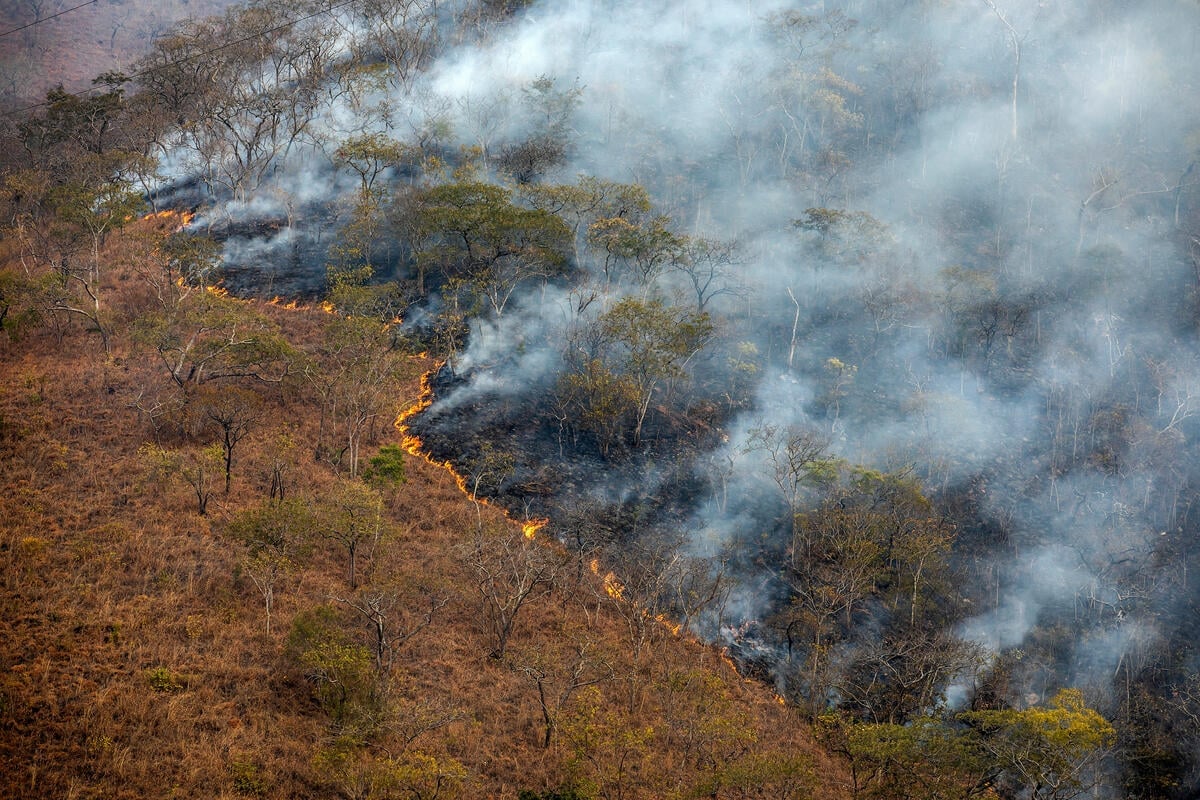January 2, 2026 | 02:07 GMT +7
January 2, 2026 | 02:07 GMT +7
Hotline: 0913.378.918
January 2, 2026 | 02:07 GMT +7
Hotline: 0913.378.918

Wildfires adversely affect biodiversity, ecological services, human well-being and national economies.
The Food and Agriculture Organization of the United Nations (FAO) has welcomed Canada’s pledge of nearly $10 million (CAD 13.5 million) to mitigate wildfire risks and protect ecosystems worldwide through the FAO-hosted Global Fire Management Hub.
Canada’s contribution was made in support of the Kananaskis Wildfire Charter, agreed last month by leaders of the Group of Seven (G7) countries at a summit in Kananaskis, Canada.
Also endorsed by the leaders of Australia, India, Mexico, the Republic of Korea and South Africa, the G7 wildfire charter encourages countries to improve the international joint response to the growing threat of extreme wildfires, including through the Global Fire Management Hub.
“Wildfire seasons are becoming longer and more extreme, fuelled by climate change,” said Cindy Termorshuizen, Canada’s Associate Deputy Minister of Foreign Affairs and Personal Representative of the Prime Minister (Sherpa) for the G7 Summit.
“The Global Fire Management Hub provides an important platform to coordinate international action in response to this trend, including strengthening global capacity for more proactive and effective integrated fire management. Canada’s leadership of the Kananaskis Wildfire Charter, launched by G7 Leaders and endorsed by international partners at the Kananaskis G7 Summit last month, is part of this effort. Canada is committed to working with the Global Fire Management Hub to better prevent, fight and recover from wildfires.”
Zhimin Wu, Director of FAO’s Forestry Division, said: “Wildfires adversely affect biodiversity, ecological services, human well-being and national economies, and can be especially devastating for developing countries. Canada’s support will help strengthen and enhance global collaboration to reduce the negative impacts of wildfires on livelihoods, landscapes and global climate stability.”
The new funds come in addition to earlier pledges from Canada in support of the Fire Hub pillars and regional activities.
Enhancing wildfire resilience through integrated fire management
The new funding will support and accelerate the work of the Global Fire Management Hub towards achieving increased collaboration among diverse agencies and actors working on fire-related issues around the world. This in turn will enhance countries’ abilities to prepare for, and respond to, wildfires and allow for greater mutual assistance during times of crisis.
The contribution will help advance the five cross-cutting pillars of the Global Fire Management Hub on knowledge and data sharing, capacity-building, wildfire resilient communities, fire risk reduction and early warning, and integrated fire management policy design and implementation.
This includes supporting the development of an Indigenous-led fire adaptation network to reinforce Indigenous fire management practices and improve sustainable forest management and resilience.
The Global Fire Management Hub
Extreme wildfires are becoming increasingly more frequent and intense, and are projected to increase by 50 percent by the end of this century.
Currently, up to 300 million hectares of the Earth's surface are burned by wildfire annually.
A collaborative platform implemented by FAO, the UN Environment Programme, the Global Fire Monitoring Centre and many other global, regional and national partners, the Global Fire Management Hub works to strengthen countries’ capacities to implement integrated fire management, shifting the focus from fire suppression to prevention and preparedness.
Earlier this month at the first Plenary of the Global Fire Management Hub, FAO launched a new international fire mascot, Pyra the Tiger, to be the familiar face of FAO’s work supporting countries and communities to manage the growing threat of wildfires.
The Global Fire Management Hub is also supported by France, Germany, Portugal and the Republic of Korea.
(FAO)

(VAN) From extensive shrimp ponds, baskets of don gathered on the mudflats, to boats carrying visitors to watch birds, all livelihoods here depend on clean water, green forests, and the calls of migratory birds.
/2025/12/26/0703-3-204813_117.jpg)
(VAN) Transparency in information and listening to local people have helped address ground clearance bottlenecks and build social consensus, thereby accelerating the progress of the JICA3 irrigation project.
/2025/12/27/0609-3-233846_327.jpg)
(VAN) The JICA3 project is expected to become a 'water shield,' helping control saltwater intrusion, proactively secure water resources, protect livelihoods, and promote sustainable development in coastal areas.
/2025/12/26/5654-3-164509_655.jpg)
(VAN) As Viet Nam makes strong commitments toward achieving net-zero emissions, controlling and reducing methane emissions in livestock production is increasingly becoming a mandatory requirement.

(VAN) 'People, Primates, Plants: Co-managing Biodiversity and Improving Livelihoods in Vietnam' (the PPP Project) is an international initiative implemented in Vietnam by BGCI, CEGORN, and ICRAF/World Agroforestry.

(VAN) Dak Nong established a risk-level zoning map for coffee, built a digital data platform for the sector, and promoted certified production in line with EUDR.
/2025/12/25/2709-1-211551_295.jpg)
(VAN) In response to the U.S. Marine Mammal Protection Act (MMPA), Gia Lai province is implementing many solutions to protect marine mammals and develop sustainable, responsible fisheries.